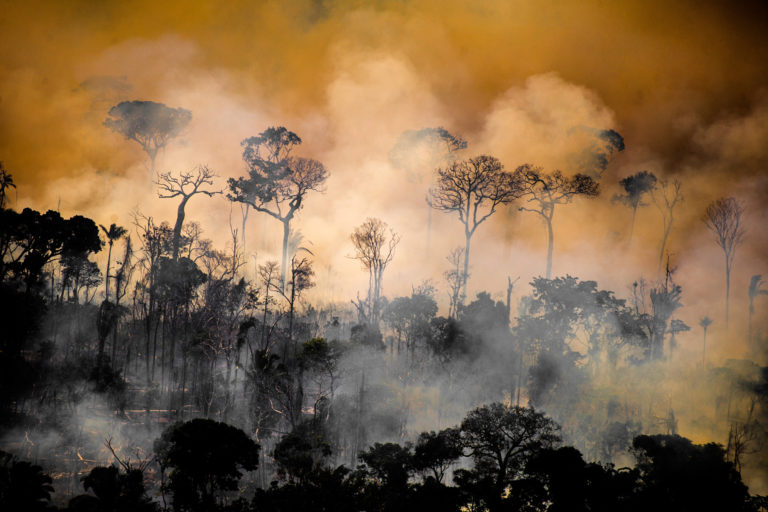Deforestation in Earth's largest rainforest surged 22% to the highest level since 2006, according to official data released today by the Brazilian government. Preliminary analysis of satellite data by Brazil's…
The U.N. climate summit now underway in Glasgow, Scotland needs to empower Indigenous peoples to protect the Amazon forest, which in turn stores carbon and helps prevent disastrous climate change.
Public hearings are underway on the proposed reconstruction of BR-319, a highway which will pierce the heart of the Brazilian Amazon, despite vast potential environmental harm, and a failure to consult Indigenous groups.
How do you get a small rancher to give up cutting trees for pasture and instead produce high-value and sustainable agricultural products without the requisite skills, money, or access to…
Brazil is likely feeding international demand for gold with bullion tainted by violence, deforestation and pollution, given that almost a third of the country’s registered gold production is classified as…
The Brazilian Amazon has been transformed by fires and deforestation into a net emitter of carbon dioxide, rather than a sink absorbing the greenhouse gas, with dangerous implications for global…
Thousands of Indigenous people marched in Brazil’s capital this week, ahead of a landmark Supreme Federal Court ruling that activists warn could hamper the official recognition of Indigenous people’s territories…
Less than two weeks after preliminary data from the Brazilian government suggested a year-over-year drop in Amazon deforestation over the past 12 months, independent analysis from a Brazilian NGO provides…
Home to a third of the planet’s tropical forests, Brazil accounts for only 0.17% of the world’s main forest-friendly exports, new research has found. Significantly smaller nations — both in…
The Brazilian state of Acre, nestled along the border with Peru and Bolivia in the Amazon, has been called “the place where the wind makes the curve,” a saying that,…
The great drought and megafires that the Amazon experienced in recent years caused the death of 2.5 billion trees and vines in the Lower Tapajós River Basin, one of the…
"In 2000, Loreto had only one protected natural area, which was the Pacaya Samiria National Reserve (RNPS), today there are 14," says Corine Vriesendorp, director of the Andean Amazon Program…
Nearly 10,000 square kilometers of the Brazilian Amazon, an area the size of Lebanon, is at high risk of being cleared, according to a new tool using artificial intelligence technology…
A profit of over 400%. That’s what BrasilAgro got from one of its early business ventures. The company bought the Cremaq farm in 2006, paying 42 million reais ($8 million)…
Colombia is courting other governments and conservation organizations for support in tackling Amazonian deforestation bringing about what it describes as one of the most ambitious emissions reduction goals in the…
RIO DE JANEIRO, Brazil — In a far-flung slice of the Brazilian Amazon, a potholed highway cuts hundreds of miles through the heart of the rainforest. In its most rudimentary…
Record floods are battering the western and central Amazon, inundating Manaus and other communities and wrecking crops. To prevent future extreme weather events, deforestation and carbon emissions must be controlled.
As central and southern Brazil, along with a third of the nation's people, face the worst drought in more than 90 years, Jair Bolsonaro wrestles with how to supply water and electricity to agribusiness and to the nation.
RIO DE JANEIRO, Brazil — The thick plumes of smoke stretched for miles across this slice of Brazil’s Mato Grosso state, blanketing the dense rainforest surrounding it. Soon, they drifted…
Slowing the pace of mass extinctions and the climate crisis requires that nature be protected. But when it comes to protected areas, some have argued that safeguarding one area can…
The climate in the Amazon has been changing over the last few decades. The average temperature in the basin rose about 1º Celsius (1.8° Fahrenheit) between 1979 and 2018, with…
Amid soaring deforestation and growing criticism due to lack of transparency and persistent attempts to weaken environmental policies, the Brazilian government is now facing a new controversy regarding forest fires,…
Gold mining activities in a region of the Brazilian Amazon ravaged by illegal operations could be suspended after prosecutors filed a lawsuit this week. In its lawsuit, the Federal Public…
A recent spate of violence related to land conflicts in northeastern Brazil has targeted Indigenous people and small-scale farmers, raising concerns from activists about impunity in the region. On July…
The Amazon has long done its part to balance the global carbon budget, but new evidence suggests the climate scales are tipping in the world’s largest rainforest. Now, according to…
As the human population grows, so does our demand for food, and soy is one of the key crops meeting that demand. Found in far more than tofu, soy is…
Deforestation in the Brazilian Amazon continued on an upward trajectory in June, reports the country's national space research institute INPE. INPE's satellite-based forest monitoring system detected 1,062 square kilometers (410…
A hundred and ninety-six trees per minute. That’s how fast the forest was being cleared in Brazil’s Xingu River Basin between March and April this year. A total of 29,191…
RIO DE JANEIRO — When the Portuguese fleet led by Pedro Álvares Cabral landed in Brazil in 1500, Pero Vaz de Caminha, a knight serving as the secretary to the…
RIO DE JANEIRO — Maracanã, Ipanema, the Lapa Arches, the Church of Our Lady of Glory of Outeiro … Millions of the visitors who flock to Brazil’s most famous city…


































































